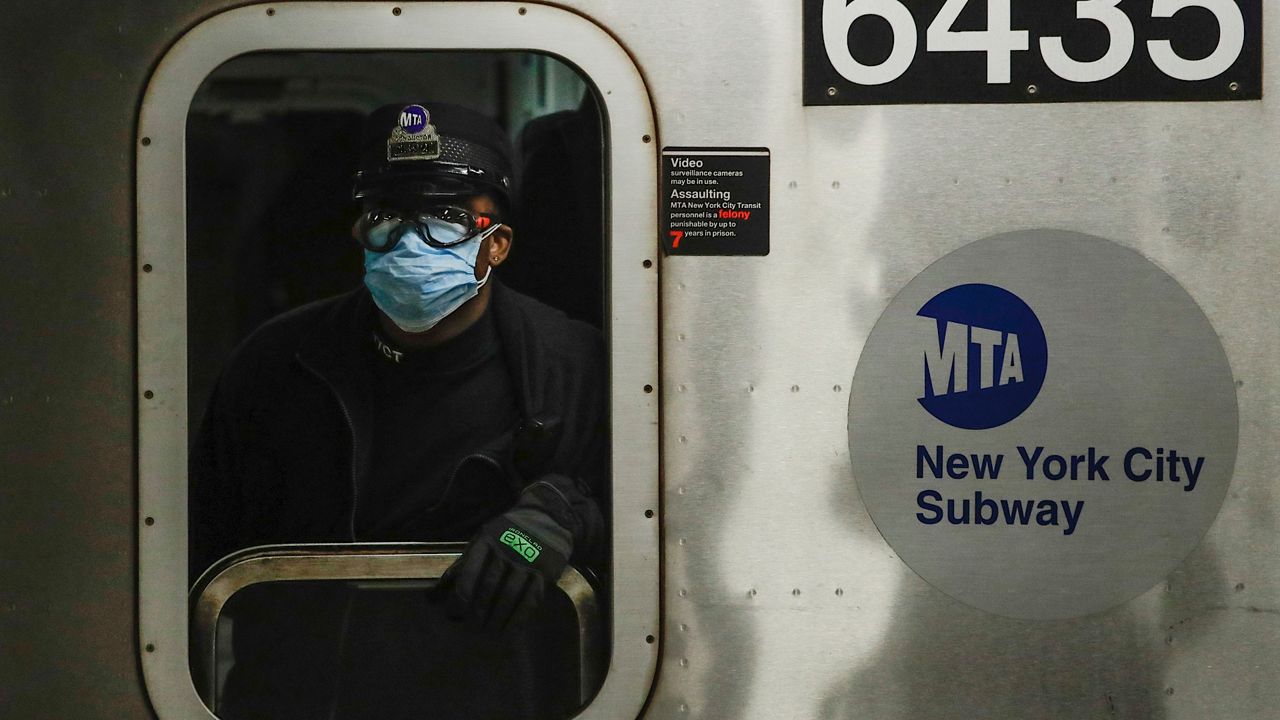Nearly a quarter of New York City’s frontline transit workers reported having had coronavirus, and those who fell ill likely contracted the virus at work, according to a new study released Tuesday.
The study, conducted by New York University in coordination with the Transport Workers Union, was launched in July to make recommendations to improve on-the-job safety for the city’s transit workers and to document the toll the pandemic has taken on the physical and mental health of essential workers.
A state report released in May found nearly 14% of city transit workers caught the virus, based on antibody testing.
MTA spokesperson Abbey Collins dismissed the NYU report as “a poll not a study,” adding that based on the agency's data, just 7% of workers contracted the virus.
“We hope any future ‘study’ is based on science, data and facts as the MTA’s highest priority remains the safety of our workforce,” said Collins.
Sarah Feinberg, the interim president of New York City Transit, also took issue with the final report, saying that only a portion of the workforce participated, and adding that previous studies have found that far fewer transit workers got COVID-19.
"I would be surprised if the numbers are truly as different as they seem, but it's certainly possible that we had a very large number of people who were completely asymptomatic and then later took antibody tests and then self-reported themselves to NYU and didn't self-report themselves to the MTA," she said.
NYU researchers sent 3,000 questionnaires to transit workers, but just 645 people sent back a response.
Researchers found that workers who lived in zip codes with low positivity rates were almost twice as likely to have the virus, suggesting they might have been infected while working.
The study also revealed that nearly 90% of transit workers are concerned about getting sick at work, and that 70% are worried for their safety when enforcing mask-wearing rules to angry or violent passengers.
Fears of illness and death, along with workplace stress seem to be taking a such toll on workers that the researcher leading the study called “it concerning.”
Transit workers continued to report to work throughout the pandemic in order to get essential workers to and from their jobs. Since then, thousands of transit workers have been infected and more than 130 of them have lost their lives to COVID-19.
More than half of those surveyed reported feeling “nervous, anxious, on-edge, and cannot control worrying;” 15% of workers reported feeling depressed; and 10% said they have trouble sleeping.
Based on the findings, the researchers recommend that the MTA not only continue offering testing—both virus and antibody—to workers, but expand it to better identify and isolate workers who may have the virus but do not show symptoms. The has also been recommended by the TWU, which represents 41,000 subway and bus workers in New York City.
One of the transit workers who caught the coronavirus was William Mora, an operator with about 15 years on the job. He got it in March.
“I took my temperature, about 100, 101. So I went into quarantine," he said. "Luckily, I have a basement and I quarantined myself.“
Fortunately, he did not pass the virus along to his wife, Lydia, or his son, Jason.
Mora said he wasn't surprised by the study's findings.
"I would figure that it would be a higher amount since the conditions that we were working with was, in the beginning, they said they were cleaning the trains, but they weren’t cleaning the trains," he said.
In addition to expanded screening, the researchers recommend that the transportation agency continue making personal protective equipment readily available. They also see an opportunity to support the wellbeing of transit workers through providing workplace mental health services.
“As a researcher who studied the aftermath of the 9/11 attacks on workers in the World Trade Center, I saw that services that supported employee mental health made a difference,” said Robyn Gershon, clinical professor of epidemiology at NYU School of Global Public Health, who leads the research project. “Some employers brought mental health professionals into the workplace for drop-in sessions, held bereavement groups, and hosted memorials to remember employees lost in the attacks. The workplaces that invested in these services—that recognized the loss of life and didn’t diminish it—fared much better than those who did not."
TWU President Tony Utano said the union asked NYU to do this research to better understand the impact the pandemic has had on transit workers.
"There are now more protective measures against the virus in place than when the crisis erupted, but we can’t let up. We need stay vigilant, and push forward with new and better ways to defend our blue-collar heroes still moving millions of riders a day," Utano said.



